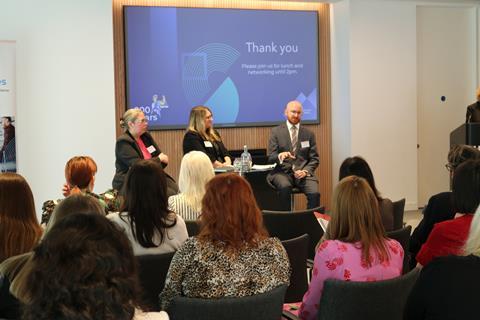Melinda Giles rounds up a recent event with a panel discussion on healthcare funding, and celebrating 200 years of the Law Society
10 March 2025 was an eventful day in Cardiff for solicitors, and in particular, private client solicitors as we gathered to listen to an eminent panel of lawyers on a complex area of law, and threw in the launch of the 200 year celebrations of the Law Society for good measure.

I had the privilege of chairing a fantastic panel of lawyers who met to discuss the differences between funding for health and social care including NHS Continuing Health Care Funding (CHC) and Section 117 aftercare services following mental health detention. The interesting twist to an already complicated discussion was the key differences between NHS England and NHS Wales.
As solicitors, we are all members of The Law Society of England and Wales, and this is because historically we share the same legal system. However, there are now some areas of law where Wales have their own devolved powers, and this includes health – meaning that NHS Wales operates its own structures, fundings and policies that may differ to those in NHS England; for example, prescriptions are free to all in Wales. In addition, and of relevance to our session, social services are also largely devolved, meaning that there are some different laws and policies.
With this backdrop, our panel of specialist lawyers were able to deal with some specific examples of where it may depend upon which side of the border someone was living or being treated, or some cases of cross-border in areas such as Powys / Shropshire or Monmouthshire / Gloucestershire.
Lisa Morgan is a partner and head of nursing care at Hugh James solicitors, and having developed a niche legal department who solely act for the elderly and families recovering wrongly paid nursing fees, we were in good hands as she walked us through the difference in assessment process in England and Wales. Even the means testing is different in social care, and we learned that the capital threshold is significantly different dependent upon whether the client is assessed in England or in Wales.
Conor Hegarty is an associate at Hugh James and leads the adult services team, and was able to update us on the changes anticipated in commissioning arrangements, and the changes that this means for patients in Wales in accessing NHS CHC via personal health budgets.
Lisa and Conor were joined by Rebecca Hegarty, who is a barrister at 30 Park Place Chambers, heading the Court of Protection team and specialising in community care law. She advises and appears in judicial review proceedings in relation to community care assessments and continuing health care.
Important takeaways
For private client solicitors who do not routinely deal with community care or funding issues it’s important to remember that when acting for an executor where the deceased was paying for nursing / residential care, to check that the correct assessments were carried out and there was no overpayment. As a professional attorney or deputy these duties are current and vital, including requesting retrospective assessments if already paying for care. We heard examples of several thousand pounds being recovered when the right steps are taken at the correct time.

It’s also important to remember that top up fees requested should not automatically be paid as the local authority (on either side of the border) is obliged to provide at least one example at their paid rate to meet your client’s needs. We spoke about that, as with so many aspects of health and social care, the system does suffer from postcode lottery and the process is easier in some areas than others.
The biggest takeaway for me was that all private client solicitors must be aware of these issues, and highlight them for our clients. However, it is a highly specialised area of law where detailed knowledge is key, and it is often best to refer on to someone who does have that specialist up to date expertise.
And last but not least, we were honoured that our session was opened by the president of the Law Society, Richard Atkinson, who welcomed us and thanked Hugh Jones for their generous hospitality in hosting the session. We were able to continue our discussions over some drinks and nibbles and a piece of cake that celebrated 200 years of the Law Society. The celebrations, that will continue around England and Wales all year, then continued in the evening at the Cardiff National Museum





